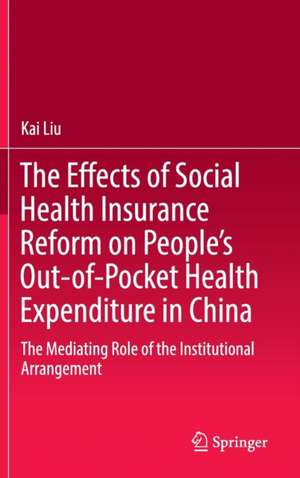The Effects of Social Health Insurance Reform on People’s Out-of-Pocket Health Expenditure in China: The Mediating Role of the Institutional Arrangement
Autor Kai Liuen Limba Engleză Hardback – 3 oct 2016
This study examines and explains the relationship between social health insurance (SHI) participation and out-of-pocket expenditures (OOP) as well as the mediating role the institutional arrangement of SHI plays in this relationship in China. Embracing a new institutionalist approach, it develops two analytical perspectives: determination, which identifies the mechanisms of social health insurance, and strategic interaction, which explores the interaction among social health insurance agencies, healthcare providers, patients, and institutions. It reveals the poor performance of social health insurance in decreasing out-of-pocket health expenditures caused by a trade-off between the reimbursement, behavior management, and purchasing mechanisms of social health insurance programs. Further, it finds that the inequitable allocation of healthcare resources and patients’ concerns regarding the benefits offset the strategies used by social health insurance agencies to manage care-seekingbehavior. It also discovers that the complex interactions between insurance agencies, doctors, patients and a larger disenabling institutional surrounding restricts the purchasing efficiency of social health insurance. This book is characterized by its unique synthesis of the role of the institutional arrangement of social health insurance in China, the interaction between the stakeholders in health sectors, and of the relationship between healthcare institutions, actors, and policy outcomes. Providing a comprehensive overview, it enables scholars and graduate students to understand the ongoing process of social health insurance reform as well as the dynamics of health cost inflation in China. It also benefits policymakers by recommending a single-payer model based on an evidence-based investigation.
| Toate formatele și edițiile | Preț | Express |
|---|---|---|
| Paperback (1) | 383.12 lei 6-8 săpt. | |
| Springer Nature Singapore – 15 iun 2018 | 383.12 lei 6-8 săpt. | |
| Hardback (1) | 390.25 lei 6-8 săpt. | |
| Springer Nature Singapore – 3 oct 2016 | 390.25 lei 6-8 săpt. |
Preț: 390.25 lei
Nou
Puncte Express: 585
Preț estimativ în valută:
74.67€ • 77.97$ • 61.66£
74.67€ • 77.97$ • 61.66£
Carte tipărită la comandă
Livrare economică 15-29 aprilie
Preluare comenzi: 021 569.72.76
Specificații
ISBN-13: 9789811017766
ISBN-10: 981101776X
Pagini: 319
Ilustrații: XXII, 184 p. 10 illus.
Dimensiuni: 155 x 235 x 13 mm
Greutate: 0.47 kg
Ediția:1st ed. 2016
Editura: Springer Nature Singapore
Colecția Springer
Locul publicării:Singapore, Singapore
ISBN-10: 981101776X
Pagini: 319
Ilustrații: XXII, 184 p. 10 illus.
Dimensiuni: 155 x 235 x 13 mm
Greutate: 0.47 kg
Ediția:1st ed. 2016
Editura: Springer Nature Singapore
Colecția Springer
Locul publicării:Singapore, Singapore
Cuprins
Revisiting the social health insurance reform in China.- A new institutionalist approach of healthcare reform.- Effects of social health insurance participation on hospitalized patients’ out-of-pocket expenditures.- Why social health insurance became a care-seeking behavior booster?.- The purchasing mechanism: A game among purchaser, patient, and doctor.- A call for a single payer model?.
Notă biografică
Prof. Liu is Assistant Professor of School of Labor and Human Resources, Renmin University of China. He develops his expertise in health policy, social policy in China, and comparative social security system. He visited University of California, Berkeley to study health policy and health economics in 2013. He won the Fulbright Scholarship and visited Harvard University to conduct a comparative study of catastrophic health spending in 2014-2015.
Textul de pe ultima copertă
This study examines and explains the relationship between social health insurance (SHI) participation and out-of-pocket expenditures (OOP) as well as the mediating role the institutional arrangement of SHI plays in this relationship in China. Embracing a new institutionalist approach, it develops two analytical perspectives: determination, which identifies the mechanisms of social health insurance, and strategic interaction, which explores the interaction among social health insurance agencies, healthcare providers, patients, and institutions. It reveals the poor performance of social health insurance in decreasing out-of-pocket health expenditures caused by a trade-off between the reimbursement, behavior management, and purchasing mechanisms of social health insurance programs. Further, it finds that the inequitable allocation of healthcare resources and patients’ concerns regarding the benefits offset the strategies used by social health insurance agencies tomanage care-seeking behavior. It also discovers that the complex interactions between insurance agencies, doctors, patients and a larger disenabling institutional surrounding restricts the purchasing efficiency of social health insurance. This book is characterized by its unique synthesis of the role of the institutional arrangement of social health insurance in China, the interaction between the stakeholders in health sectors, and of the relationship between healthcare institutions, actors, and policy outcomes. Providing a comprehensive overview, it enables scholars and graduate students to understand the ongoing process of social health insurance reform as well as the dynamics of health cost inflation in China. It also benefits policymakers by recommending a single-payer model based on an evidence-based investigation.
Caracteristici
The first book to investigate the mediating role institutional arrangement plays in the relationship between social health insurance participation and out-of-pocket health expenditures in China Reveals the poor performance of social health insurance programs in decreasing out-of-pocket expenditures caused by a trade-off between the internal mechanisms of these programs Uncovers the complex interactions between social health insurance agencies, healthcare providers, patients, and healthcare institutions in China Includes supplementary material: sn.pub/extras















